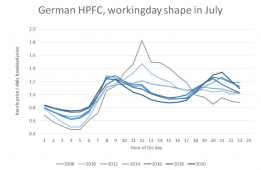Fires fires fires

lol nope, the electrical requirements are still the same - just a inspection was added - but additionally now you need all sorts of roof windload calculations, engineered drawings and the utility want's to have your power bill and you can't build like more then 110% of your usage.
Then again the grid operator shouldn’t be forced to buy something it doesn’t want.
At least I can diy simply by not telling anyone at micro-generation levels.
Personally I think grid export is nonsense and should be banned at micro -generation levels
If there would a free power market where anyone could sell and buy - that wouldn't be an issue.
The Issue is that the Grid Operator and the Power Producers are the same in US - in Europe those are separate entities. So you either do the lines or you run power plants - not both.
Would be same if construction firms would own the run tolls on the roads . Infrastructure for markets should be run by Governments.
The Grid Operator shouldn't be buying anything - the should charge a fee for transmission. Who ever end-user want's the energy should buy it.
As a Power producer I should be able to sell to the highest bidder - every household, industry, etc' should be able to see the current pricing and buy when they choose. If nobody wants my PV power - then I can't sell it.
There is a case for batteries, could save my PV power during the day and discharge when prices are high during the evening.
I’ve read the strategic report from our grid operator who currently owns the largest EV charging system. They envisage 30 year grid EV program. Their huge problem is housing estates where cabling is all underground and limited capacity. Upgrading this means large scale trenching and disruption. The next big upgrade is the medium voltage grid. But this is almost all over ground.
If you do demand side management and charge those cars during low peak operations - no additional capacity needed.
In the new code for I think 2025 - all EVSE shall be Grid-interactive - to take advantage of low pricing.
The average driver goes about 35 miles a day - it 4 miles / kwh that's a measly 9kwh/h / day for a person driving a car. That's like leaving your stove on for 3 hours to make turkey. Nothing the grid can't handle
The only issue arrive when everyone comes back home at 6PM and charges the car and turns the stove on.
This will be very rural, and this power will not be consumed here, it will be sent to Chicago, etc. There is a fight going on, and lots of political influence at work here.
Free powermarket would solve this - non-electected Government would run the grid (like roads) and everyone can sell and purchase power.
Large solar farms are the way to go in my opinion.
Large scale solar yes - farms no.
Cover all Parkinglots in the Country with Solar Carports- use exiting infrastructure and don't dig up valuable farmland and natural resources.
There are 800.000.000+ public Parkingspots - close to the end user of power. Further there are massive amount of driveways with additional 400-600 million parking spots. One Parkingspot is 5-6KW it's a standardized format - very good for mass production. Instead of the complexity of roof-top installations
For very economic reasons - the amount of parking infrastructure correlates with high energy usage. If you get massive solar carports on every parking lot - you reduce all the losses from Solar Farms which are out in the middle of nowhere and need large trenching or overhead lines.



